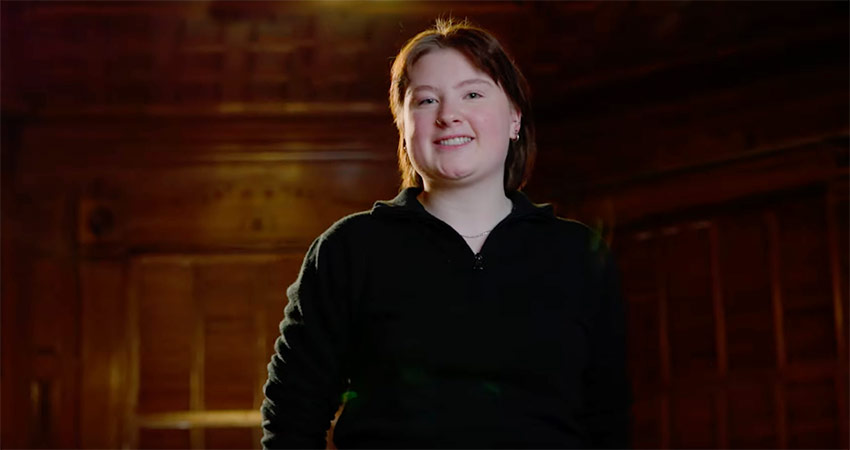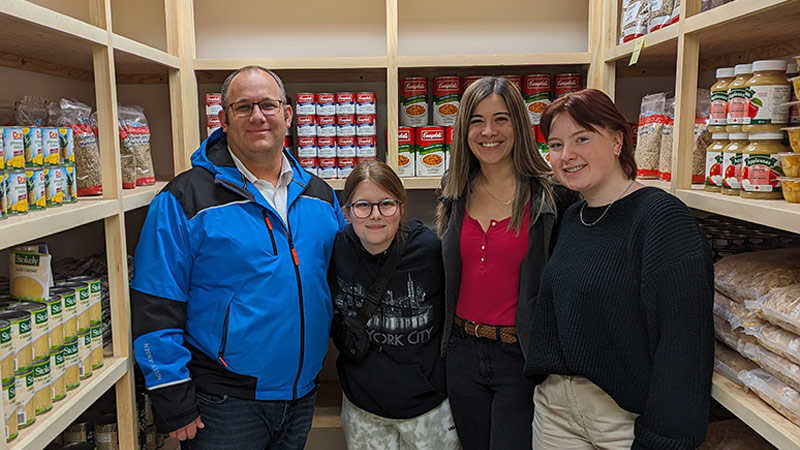Lucy Armstrong helps students eat better so they can focus on their studies
Author: Alex Graham
Posted on Mar 22, 2024
Category: UNB Fredericton

Food insecurity is about more than just not having enough calories to get through the day.
“It’s one of those things where you wouldn’t look at someone and say, ‘that person is food insecure’,” explained University of New Brunswick (UNB) undergraduate student Lucy Armstrong, co-founder of the UNB Fredericton campus food bank.
“Food insecurity is the lack of access, or funds, or anything that prevents you from being able to provide food for yourself.”
Through the pursuit of her bachelor of philosophy and interdisciplinary studies degree at Renaissance College, UNB’s unique initiative combining rigorous academic content with experiential learning, Armstrong discovered that she had a passion for food security both on and off campus.
That led Armstrong into partnership with the UNB Student Union (UNBSU) to co-found the Fredericton campus’ first food bank in the student union building last fall.
“Whether it’s providing food in general or finding food that has the correct nutritional value to keep up with your needs, being able to find the right cultural foods or, having the equipment to cook food – food insecurity is a big issue that people face,” Armstrong said.
“They might not have the cooking skills, or they might not have a pan to cook their meals and that creates a lot of barriers for people.”
When students are at school, they often put all their financial resources towards books, tuition and rent, making food a second or even third tier priority. With the introduction of an easy to access, on-campus food bank, Armstrong says student clients can lay down one of the burdens they carry in their journey to complete their education.
“Some of the impact of the food bank I’ve seen is students not having to worry about where they’re getting food from, or stress about how they’ll be able to afford it,” she said.
“It’s giving students more time to be able to focus on their studies as well as be fully nourished and have the energy to be able to focus on their studies.”
It was through the experiential learning opportunity at Renaissance College that Armstrong found her drive to create positive change in her community.
She had the opportunity to work for 11 weeks at a food bank in Guelph, Ontario. She described the experience as eye-opening and began to look for opportunities to apply what she’d learned to other aspects of her educational experience, and to her life in general. That’s where the experiential learning aspect of her degree really helped her develop her career path towards food security.

Photo: Alex Boyd, Greener Village's; UNBSU VP Events and Services, Kierra MacAlpine; UNBSU president Amanda Smith; and UNBSU Food Coordinator, Lucy Armstrong in the Fredericton campus food bank.
“Through being able to do an internship for the arts program, I’ve been able to apply 15 hours per week to helping with food security on campus. That wouldn’t have been possible without the other experiences I’ve had through UNB.”
Related: Campus foodbanks help students break the cycle of poverty
Working with the student union, the food bank has implemented several policies to maintain the privacy of clients, to help alleviate any shame people may feel about using this service. Clients are assigned an identification number and a time to visit the bank to protect their anonymity.
The only goal in the program is to get food to the people who need it, so they can focus on their reason for being at university – to get an education.
“I just want to help people get up on their feet and be able to succeed.”
Banner photo: UNBSU Food Coordinator, Lucy Armstrong.
UNB is a centre for experiential education connecting students with industry and the community, building a skilled, qualified workforce for tomorrow. Over the next four weeks, we will share stories of students deepening their learning outside the classroom, discovering their passions and making meaningful change in the world around them.
Other stories in the series: $14-million Student Investment Fund celebrates 25 years of hands-on learning
